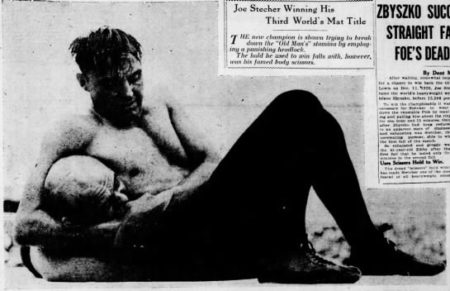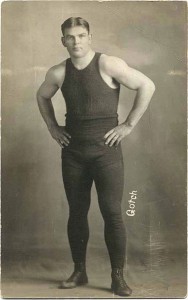ברנס מכחיש את הקשר עם סטכר
In early 1916, סנונית “חקלאי” ברנס, שאימן וניהל את פרנק גוטש לאליפות העולם במשקל כבד, החל להכחיש שהוא פיתח את האלוף האמריקאי הנוכחי במשקל כבד ג'ו סטכר. הטענה נראתה מוזרה כי ברנס עבד עם סטכר כבר כמה שנים. ברנס עזר להכין את סטכר לקרב האליפות שלו עם צ'רלי קאטלר 1915.
במובן מסוים, what Burns said was true because Stecher learned from both his brother Tony and wrestling coaches in Nebraska before meeting “חקלאי” ברנס. While a senior in high school and only 16 גיל, Stecher almost defeated professional wrestler Dr. Benjamin Roller. Stecher received excellent training before he met “חקלאי” ברנס.

Photo of Stecher and Zbyszko wrestling at St. Louis University Field on May 30, 1925
אולם, Burns polished Stecher, who he met after Stecher turned pro in 1912. While Burns was touring with Yussif Mahmout, who was challenging all comers in a carnival setting, Stecher answered his challenge. Mahmout had to bite Stecher to be disqualifed after being caughter in Stecher’s scissor hold.
Stecher defeated Cutler for the vacant American Heavyweight Championship, under Burn’s tutelage. So why would Burns distance himself from Stecher? It was actually quite simple. The men were preparing for a “עבד” or prearranged exhibition with former undisputed World Champion Frank Gotch.
The wrestling public and more importantly the sporting press were skeptical of the legitimacy of wrestling bouts. Charges of “faking” outcomes dogged the sport since at least the 1870s. Gotch worked many legitimate matches in his career but also took part in “עבד” exhibitions. Gotch was motivated to put Stecher over and pass the torch to his and Burns’ young protege because Gotch was tired of being challenged.

פרנק Gotch מהמרחב הציבורי
After his 1911 marriage to his wife Gladys, Frank Gotch wrestled fewer and fewer matches. He retired as reigning world champion after beating Georg Lurich in 1913. אולם, wrestlers such as Aleksander “אלכס” Aberg continued to challenge him over the next couple of years. Gotch was like the retired gunfighter that every young gunsel wanted to make a reputation on.
If Gotch lost to Stecher, it would end all the challenges. The public already looked at Stecher as Gotch’s successor, so this victory would cement the prevailing view. Both Gotch and Burns liked Tony and Joe Stecher. They saw it as a win-win for everyone.
אולם, Gotch was injured in training during 1916 and the match never occurred. Gotch died at only 40 years of age from blood poisoning in December 1917. Despite not “defeating” Gotch, the wrestling public continued to recognize Stecher as the champion. Burns would be free to continue working with Stecher.
Stecher won the world championship several times before retiring in 1934. He later suffered some type of breakdown and spent 30 years in an assisted living facility.
Lou Thesz held Tony Stecher, who by the 1930s was a promoter, in high regard. He met Joe Stecher several times. While he was impressed by Joe’s accomplishments and was very kind when they met, Thesz also said Joe’s mental health challenges were obvious to anyone who interacted with him. He died at 80 years of age in 1974.
You can leave a comment or ask a question about this or any post on my דף פייסבוק.
Source: <תוחלת bbox_x = bbox_y "971" = bbox_w "2027" = bbox_h "13" = fsize "19" = fweight "13" = ירוק "3" אדום = "255" = "255" כחול = אלפא "255" = ". Louis Star-Times, פברואר 1, 1916 edition, עמ '. 9 ו - זוֹנָה מאת לו ת'ז
Pin It
